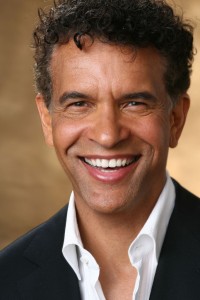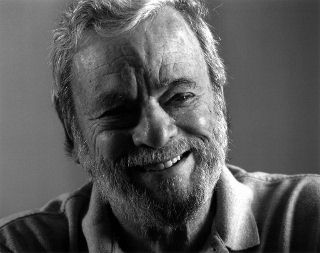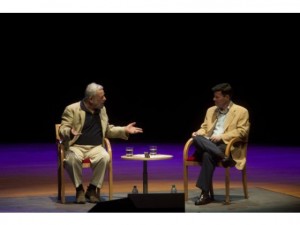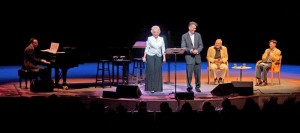IT COULD HAVE BEEN WONDERFUL
Attendees who had never seen Stephen Sondheim being interviewed in person must have been licking their chops with every juicy morsel that the legend said about himself to the packed house at Segerstrom Concert Hall’”especially those who have been listening to Sondheim’s musicals for years. The great Broadway composer sat down with Michael Kerker, director of musical theatre for ASCAP, for an evening of sparse dialogue interspersed with performances from Tony-winning Broadway highlighters Christine Ebersole and Brian Stokes Mitchell. The idea, it seems, would be for the duo to chat it up a bit, then our “musical guests” would illuminate whatever tidbit they were discussing. The event was a reschedule from last October, when Sondheim was stuck in a freak snowstorm’”a night which was rescued by an impromptu concert by Ebersole and Mitchell. Friends whom I unreservedly trust told me it was quite an amazing concert, but the rescheduled evening I witnessed in the gorgeous hall, titled Stephen Sondheim: In Conversation, was intermittently interesting and occasionally entertaining, but hardly amazing.
Naturally, one cannot help but be fascinated listening to the garrulous genius speak. As if I had to remind myself, I scribbled the notes, “I could listen to him forever.” To begin with, his mannerisms are mesmerizing: ill-at-ease one minute, kindly the next, and snappish the next. He is physically and emotionally expressive; when Ms. Ebersole sang “Losing My Mind,” a broad smile swept over his face like a proud parent; when he’s peeved about any particular subject, he seems like a petulant teenager. Plus, the raconteur, who has crossed paths with Broadway’s brightest creators, is still sprightly, sharp, and awash with opinionated insight.
There were a few indelible moments, including the thrill of watching Sondheim beam behind Ebersole when she sang “Losing My Mind,” even though Ebersole is not the best interpreter of Sondheim (more on that to follow). The moment is also meaningful because, let’s face it, “Losing My Mind” is the only song from Sondheim’s repertoire besides “Send in the Clowns” that comes close to being a “standard.”
But the word “conversation’ is somewhat of a misnomer. This was hardly an informal interchange of thoughts, but a series of planned questions. Still, the erudite, frank, and witty Sondheim was never short of pearls of wisdoms regarding songwriting, such as “You don’t write to please an audience,” and other instructional advice that he has imparted before, such as “Clarity is everything.” But the “conversation” on the whole felt tepid, like an interview at a book-signing, and surprisingly, it occasionally verged on dull.
Towards the conclusion of the evening, Kerker asked the composer if there was anything he would like to tell that hadn’t already been revealed in conversation or his books. With his trademark sheepish but impish grin, Sondheim replied, “Nope.”
Well, with a question like that, what else could we expect? But as Sondheim proved last year in his scathing response to Patrick Healy’s article about The Gershwin’s Porgy and Bess, the 82-year-old American Musical transformer has plenty to say which has not been said before. Personally, I would be fascinated to know why, given his undesirable view of critics, he would respond to this article with such vehement criticism. I would say something like, “Steve, Harold Clurman is purported to have stated that the job of a critic is to demolish the bad to make way for the good. Since you have such a keen eye and an appropriately bleak view of modern musicals, would you not do a great service to the theater by being a critic?”
Perhaps such a question would be deemed too incendiary, but the evening would have been far more electrifying had our interviewer taken on the role of instigator. Instead, Kerker took the safe route with questions such as, “What did you learn from the first three composers that you worked with?” It’s not that there is anything wrong with such a query, but it indicates why the evening felt flat: instead of interviewing Sondheim the master and learned scholar of Broadway composition, why not interview Sondheim the man behind what has already been imparted?
From 2002 to 2011, before Sondheim published his annotated collections of lyrics, Finishing the Hat and Look, I Made a Hat, he had a series of conversations throughout the states with Frank Rich. It was exciting to hear Sondheim at that time, not only because he imparted a wealth of new information to which even the most rabid fan had not been privy, but because there was still an assumption that Sondheim had another show on the horizon (at Ravinia Park, sans Rich, Sondheim stated that he was looking at the possibility of musicalizing the film Groundhog Day).
But now in 2012, it has been almost twenty years since Sondheim’s last Broadway show, Passion. In the interim, he has worked on-again, off-again on Road Show (a.k.a. Wise Guys and Bounce), but with all that tinkering in production after production, the musical has yet to find itself. In response to Kerker’s question, “What did you learn from the first three composers that you worked with?” Sondheim said that he learned nothing from Jule Styne (Gypsy), who would never retool a song, but would write an entirely new composition instead. I wondered if Sondheim could have learned something from Jule Styne after all; instead of scrapping a song as Styne did, would there have been a benefit in scrapping an entire enterprise that wasn’t working?
 I understand the veneration bestowed on Sondheim, but Kerker’s timidity led to some odd answers. For instance, his exploration of why Company was a groundbreaking show led to this intriguing revelation: “It’s a revue, but not a revue.”
I understand the veneration bestowed on Sondheim, but Kerker’s timidity led to some odd answers. For instance, his exploration of why Company was a groundbreaking show led to this intriguing revelation: “It’s a revue, but not a revue.”
If you’ve never been to the Renée and Henry Segerstrom Concert Hall in Costa Mesa, then you simply can’t imagine a more beautiful, intimate, and comfortable concert hall anywhere in America, with its wide-open space and curvaceous tiers. Sadly, the sound, which is normally outstanding, echoed for the talk, and popped and clicked for the singers.
The song selections did not seem so adventurous, and I found it peculiar that Brian Stokes Mitchell sang two duets with himself’”“Pretty Women” and “It Would Have Been Wonderful.” Stokes was so busy sputtering out consonants, that it left no room for interpretation. Mitchell is a consummate showman with a rich baritone, but there was little inner analysis of Sondheim’s lyrics. Even though “Finishing the Hat” was lovely, these songs need to be acted, not just presented. On top of that, Mitchell sounded strained and forced, and scooped to his high notes, using a hand-held mike while looking at his music from a music stand (as did Ms. Ebersole). For a concert of this magnitude in such a magnificent hall’”and with all these months to prepare, that kind of performance felt inappropriate. (On piano, Tedd Firth displayed the evening’s greatest emotional depth.)
 Ms. Ebersole was in strong voice and far more successful in discovering emotional colors in her work, but she, too, seemed out-of-place, and was perhaps not the best choice to deliver the dramatic context of Sondheim`s music. For example, “I Never Do Anything Twice” (from the film The Seven-Per-Cent Solution) although perfect for her sly and witty demeanor, required the world-weariness of an aging Madame; from Ms. Ebersole, it was merely cute. The “Move On” duet with Mitchell was a rare highlight, but the songs from Sondheim shows are so specifically attuned to the prerequisites of the plot that the non-theatrical performances at this event almost felt irrelevant.
Ms. Ebersole was in strong voice and far more successful in discovering emotional colors in her work, but she, too, seemed out-of-place, and was perhaps not the best choice to deliver the dramatic context of Sondheim`s music. For example, “I Never Do Anything Twice” (from the film The Seven-Per-Cent Solution) although perfect for her sly and witty demeanor, required the world-weariness of an aging Madame; from Ms. Ebersole, it was merely cute. The “Move On” duet with Mitchell was a rare highlight, but the songs from Sondheim shows are so specifically attuned to the prerequisites of the plot that the non-theatrical performances at this event almost felt irrelevant.
As soon as someone produces Irving Berlin: In Conversation with Christine Ebersole, I’m there.
——————————————————————————
Stephen Sondheim: In Conversation With Special Musical Guests
played on July 13, 2012
Renée and Henry Segerstrom Concert Hall in Costa Mesa
for future events at Segerstrom Center, call 714.556.2787, or visit http://www.scfta.org/




